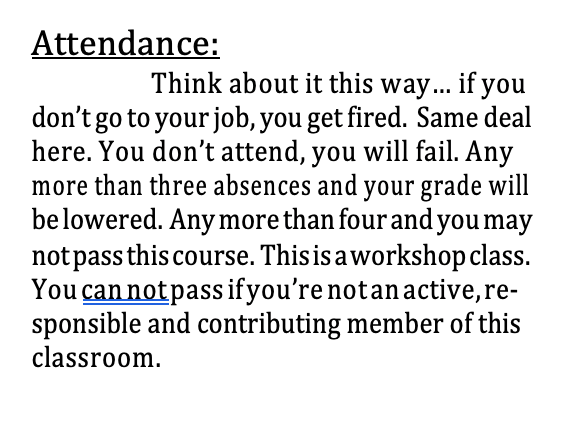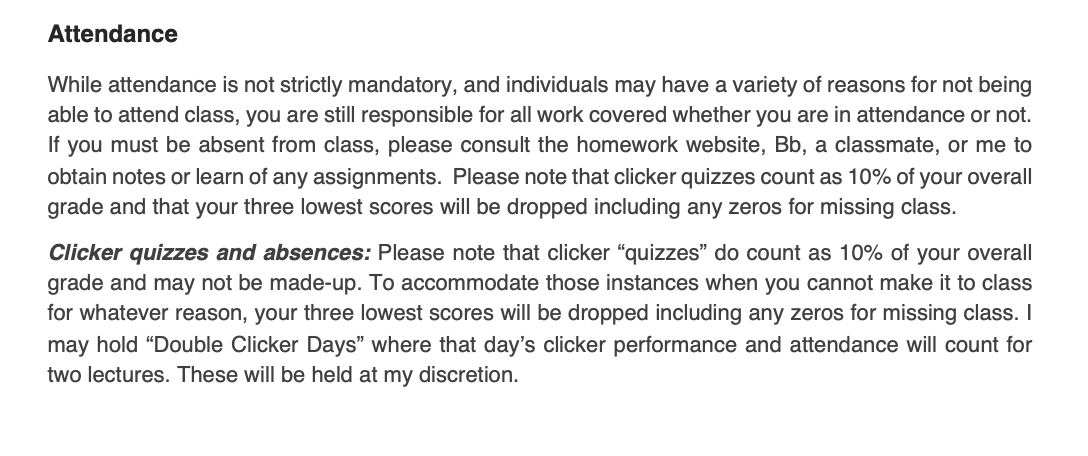Attendance
 A student’s participation in course work is a precondition for receiving credit for the course. Students are expected to punctually attend all lectures, laboratory sessions, and field experiences. As well as to participate in course assignments and activities described in the course syllabus. Each instructor shall determine the class attendance policy for each of his or her courses as long as the instructor’s policy does not conflict with the university’s.
A student’s participation in course work is a precondition for receiving credit for the course. Students are expected to punctually attend all lectures, laboratory sessions, and field experiences. As well as to participate in course assignments and activities described in the course syllabus. Each instructor shall determine the class attendance policy for each of his or her courses as long as the instructor’s policy does not conflict with the university’s.
The instructor’s attendance policy, along with other course requirements, will be provided to the class on the syllabus distributed at the first class meeting. Class attendance may be used as a criterion for determining a student’s final grade in the course if the instructor provides a written statement to this effect in the course syllabus.
ECU Faculty Manual Statement on Class Attendance and Participation Regulations (Part VI, Section 1, X):
X. Class Attendance and Participation Regulations
“A student’s participation in the work of a course is a precondition for receiving credit for the course. Students are expected to attend punctually all lecture and laboratory sessions and field experiences and to participate in course assignments and activities as described in the course syllabus. Absences are counted from the first class meeting after the student registers. Students registering late are expected to make up all missed assignments in a manner determined by the instructor.
Each instructor shall determine the class attendance policy for each of his or her courses as long as the instructor’s policy does not conflict with university policy. The instructor’s attendance policy, along with other course requirements, will be provided to the class on a syllabus distributed at the first class meeting. Class attendance may be a criterion in determining a student’s final grade in the course if the instructor provides a written statement to this effect in the course syllabus. In determining the number of unexcused absences which will be accepted, the instructor should consider carefully the nature of the course, the maturity level of the students enrolled, and the consequent degree of flexibility included in the instructor’s policy.
Students should consult with their instructors about all class absences. It is the responsibility of the student to notify the instructor immediately about class absences, to provide appropriate documentation for an absence, and discuss any missed class time, tests, or assignments. Except in the case of university-excused absences, it is the decision of the instructor to excuse an absence or to allow for any additional time to make up missed tests or assignments. Excused absences should not lower a student’s course grade, provided that the student, in a manner determined by the instructor, is able to make up the work that has been missed and is maintaining satisfactory progress in the course.
Student Health Services does not issue official written excuses for illness or injury, but will, upon request at the time of the visit, provide a note confirming that the student has received medical care. In the event that the student is seriously ill or injured at the time of final examinations the Student Health Service or the Center for Counseling and Student Development, on request of the student, may recommend a medical incomplete. Instructors should normally honor written medical excuses from a licensed medical or psychological practitioner that states the student was too ill or injured to attend class and provides the specific date(s) for which the student was unable to attend class due to the medical or psychological problem.
The Dean of Students may authorize university-excused absences in the following situations:
- Student participation in authorized activities as an official representative of the university (i.e. athletic events, delegate to regional or national meetings or conferences, participation in university-sponsored performances).
- Participation in other activities deemed by the Dean of Students to warrant an excused absence, such as required military training.
- An extreme personal emergency or serious medical condition.
- The death of an immediate family member (such as parent, sibling, spouse or child)
- Student participation in religious holidays.
It is the student’s responsibility to obtain verification of a university-excused absence by contacting the Dean of Students. Faculty requests for university-excused absences should be submitted according to the timeline established by the Dean of Students. Requests submitted after the fact will be disapproved unless circumstances made prior approval impossible.
Instructors are expected to honor valid university-excused absences and to provide reasonable and equitable means for students to make up work missed as a result of those absences. Students who anticipate missing 10% or more of class meeting time as a result of university excused absences are required to receive approval from the instructor at the beginning of the semester. Student experiences that cannot be made up should be discussed at the onset of the course to ensure that continued enrollment is feasible while there is still the opportunity to drop the course within the schedule change period.
No instructor should urge a student to take part in an extracurricular activity at the expense of the student’s classwork or expect the student to appear at any practice or rehearsal if he or she has a scheduled class at that time. No class absences will be excused for practices or rehearsals. Only absences for performances and necessary travel to and from performances are excused.
A student who believes that he or she has been treated unfairly concerning absences or has been misinformed by the instructor regarding that instructor’s absence policy shall have the right to appeal. The appeal shall be in writing to the instructor’s department chairperson or school director, and in the event the resolution is not satisfactory, the final decision rests with the academic dean.
(FS Resolution #12-62, April 2012; FS Resolution #17-79, December 2017)” (East Carolina University Faculty Manual Part VI, 2020)
Examples

(NURS 3210)
_______________________________________________________________________________

(Vanessa Alander, English Composition)
_______________________________________________________________________________
